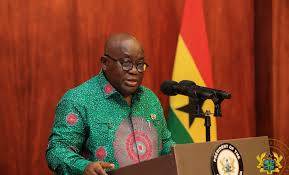**‘Eyes Are Watching’ – Krontihene of Akyem Asuo Warns Clergy, Chiefs Who Stayed Silent Under Akufo-Addo**
The Krontihene of Akyem Asuo, Nana Kwabena Ofori, has issued a strong rebuke to members of the clergy and traditional leaders who remained silent during the tenure of President Nana Akufo-Addo, despite widespread concerns about governance, corruption, and economic mismanagement. Speaking at a public event, Nana Ofori reminded leaders that their roles as moral and cultural guardians demand that they stand for truth and accountability, regardless of political affiliations.
In a speech filled with candid criticism and warnings, the Krontihene urged these leaders to reflect on their inaction and its consequences for Ghanaian society. “Eyes are watching,” he declared, emphasizing that the Ghanaian people are aware of the silence exhibited by those who should have spoken out against injustices and shortcomings in the government.
### **The Role of Clergy and Chiefs in Governance**
In Ghana, both the clergy and traditional chiefs hold influential positions in society. They are often viewed as the moral compass of the nation, expected to speak truth to power and advocate for the welfare of their people. Historically, these groups have played critical roles in shaping political discourse, mediating disputes, and holding leaders accountable.
However, Nana Ofori lamented that during the Akufo-Addo administration, many of these leaders appeared to abdicate their responsibilities. While ordinary citizens and civil society organizations raised concerns about issues such as corruption, economic hardship, and alleged nepotism, the silence from many clergy members and chiefs was deafening.
“Their silence was not just a betrayal of their responsibilities; it was a betrayal of the people they claim to serve,” Nana Ofori said. He questioned whether their silence was due to fear, political bias, or personal gain, warning that such behavior erodes public trust in institutions meant to uphold justice and fairness.
### **Key Issues Under Akufo-Addo’s Administration**
Nana Ofori’s remarks come against the backdrop of several controversies that marked Nana Akufo-Addo’s presidency. Critics of the administration frequently highlighted:
- **Corruption Allegations**: Accusations of corruption and mismanagement were rampant, with high-profile scandals involving public funds and government officials.
- **Economic Struggles**: The Ghanaian economy faced significant challenges, including inflation, a depreciating cedi, and a rising public debt burden.
- **Perceived Nepotism**: The administration was accused of favoring certain families and individuals, raising concerns about fairness and inclusivity in governance.
- **Suppression of Dissent**: Activists and journalists who criticized the government often faced threats and harassment, further stifling public discourse.
Despite these pressing issues, Nana Ofori noted that many clergy members and chiefs refrained from openly criticizing the government or advocating for reforms.
### **A Call for Accountability**
Nana Ofori called on these leaders to acknowledge their inaction and take steps to rebuild their credibility. “The people are not blind. They saw who spoke up and who chose silence. The clergy and traditional rulers must remember that their silence speaks volumes, especially during times of crisis,” he said.
He further reminded the clergy and chiefs that their primary allegiance should be to the people and the principles of justice and truth. “When you fail to uphold these principles, you lose the respect and trust of the people,” he cautioned.
To restore faith in their leadership, Nana Ofori urged them to adopt a more proactive stance moving forward. He encouraged them to engage with communities, listen to their concerns, and advocate for policies that promote social and economic justice.
### **Reactions to the Krontihene’s Remarks**
Nana Ofori’s comments have sparked widespread debate, with many Ghanaians applauding his boldness. Social media platforms have been flooded with discussions about the role of traditional and religious leaders in governance, with some calling for greater accountability from these groups.
“Finally, someone has said what we’ve all been thinking,” one commentator wrote. “Our leaders cannot sit on the fence when the country is facing such challenges.”
Others, however, have defended the clergy and chiefs, arguing that speaking out against the government is not always straightforward. “It’s easy to criticize, but these leaders often face immense pressure and risks when they challenge those in power,” a social media user noted.
### **The Path Forward**
Nana Ofori’s remarks underscore the importance of active and engaged leadership in addressing Ghana’s challenges. As the country moves forward, the Krontihene emphasized the need for a collective effort to rebuild trust in institutions and promote good governance.
He also highlighted the role of the younger generation in holding leaders accountable. “The youth must take up the mantle of leadership and ensure that silence in the face of injustice is never an option,” he said.
### **Conclusion**
The Krontihene of Akyem Asuo’s call to action serves as a wake-up call for Ghana’s clergy and traditional chiefs. By reminding them of their responsibilities as moral and cultural leaders, he has reignited conversations about the role of these institutions in governance
As Nana Ofori aptly stated, “Eyes are watching.” The Ghanaian people are paying attention, and they expect their leaders—both elected and traditional—to stand for truth, justice, and accountability. The question now is whether these leaders will rise to the occasion or continue to remain silent when their voices are most needed.



